外研版八年级下册Module 10 On the radio Unit 2 It seemed that they were speaking to me in person课件(共46张PPT)
文档属性
| 名称 | 外研版八年级下册Module 10 On the radio Unit 2 It seemed that they were speaking to me in person课件(共46张PPT) |  | |
| 格式 | ppt | ||
| 文件大小 | 971.0KB | ||
| 资源类型 | 教案 | ||
| 版本资源 | 外研版 | ||
| 科目 | 英语 | ||
| 更新时间 | 2022-07-21 11:15:26 | ||
图片预览


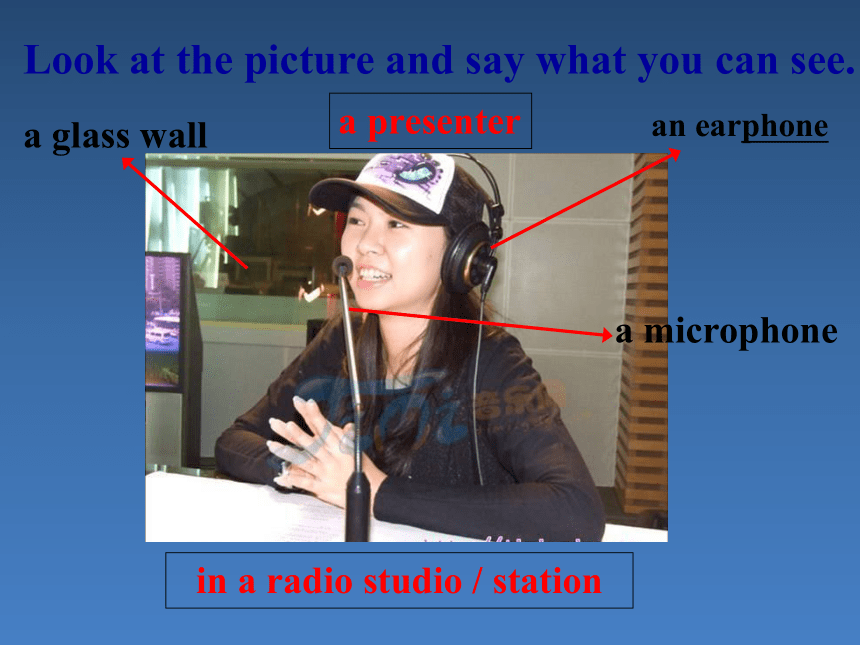
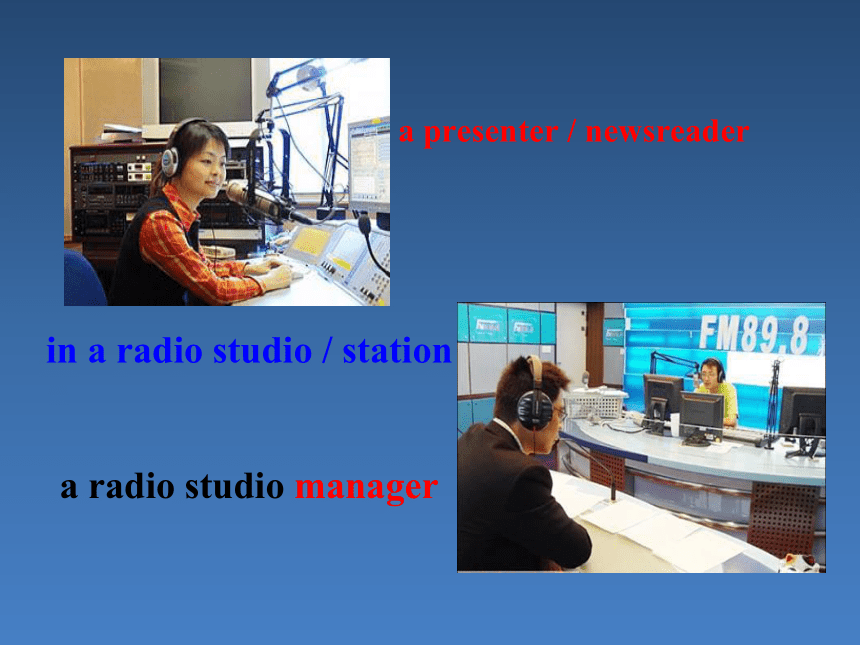
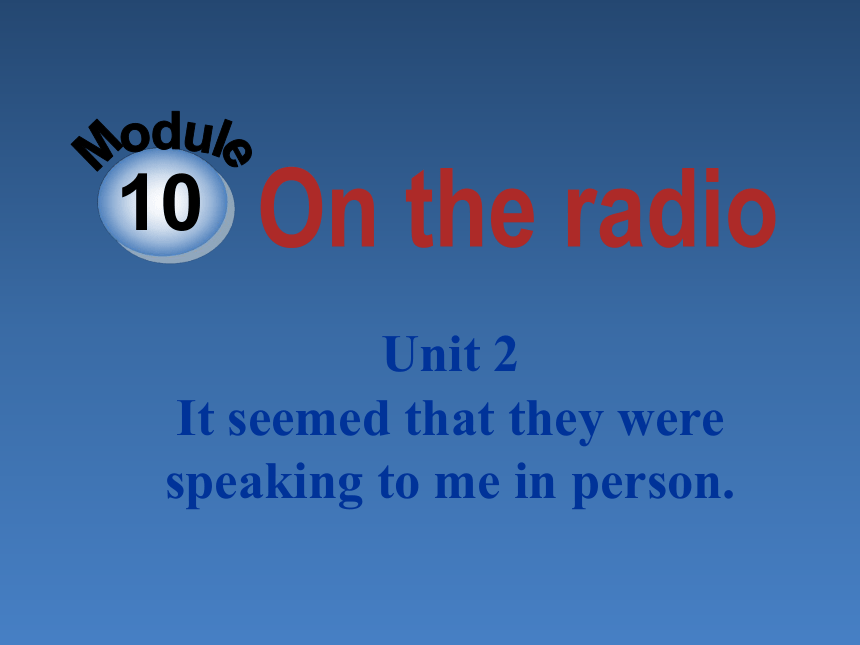

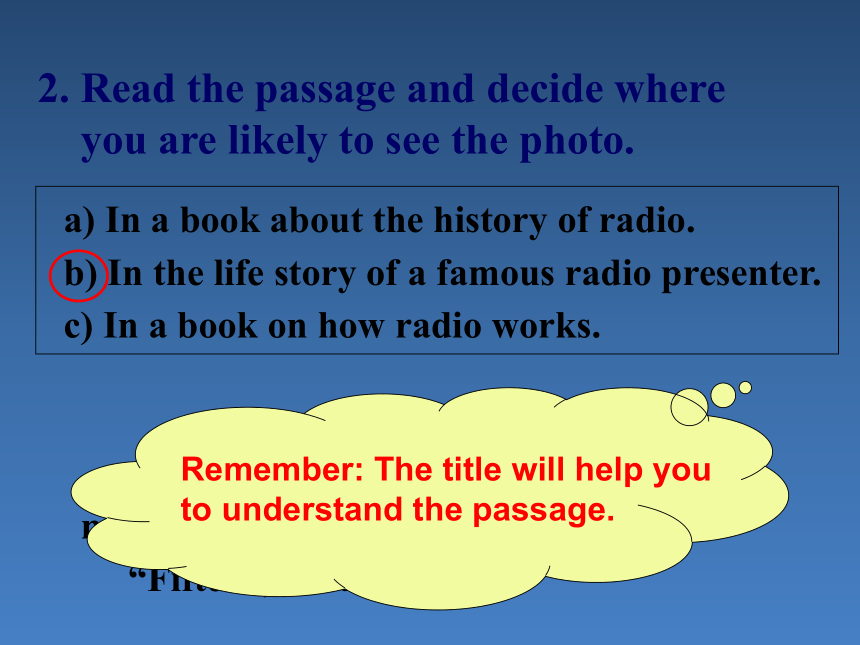
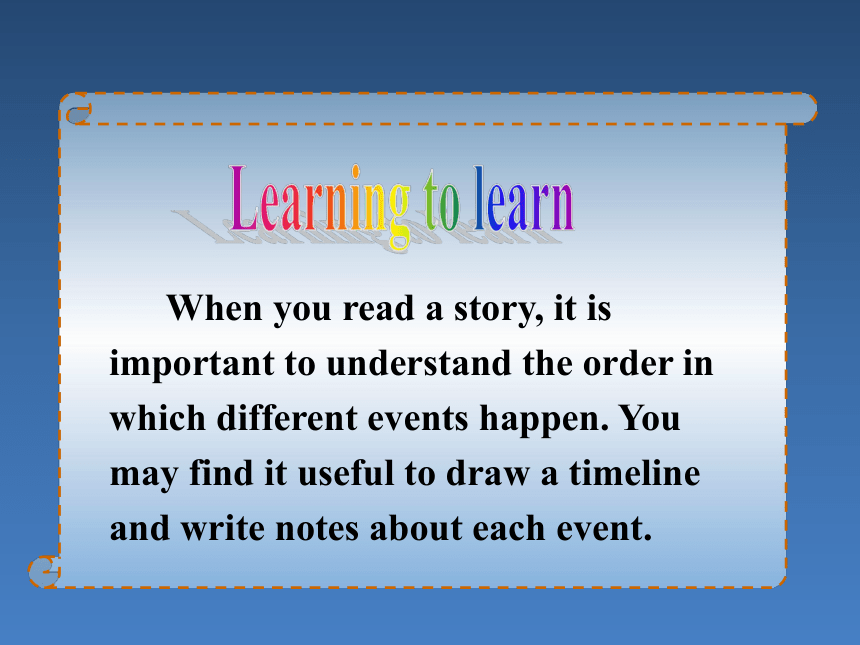
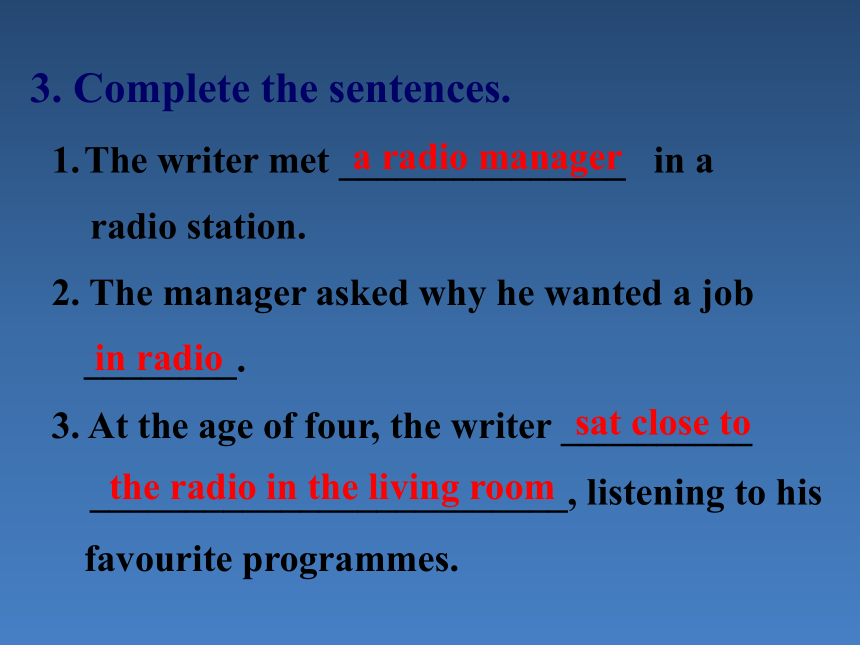

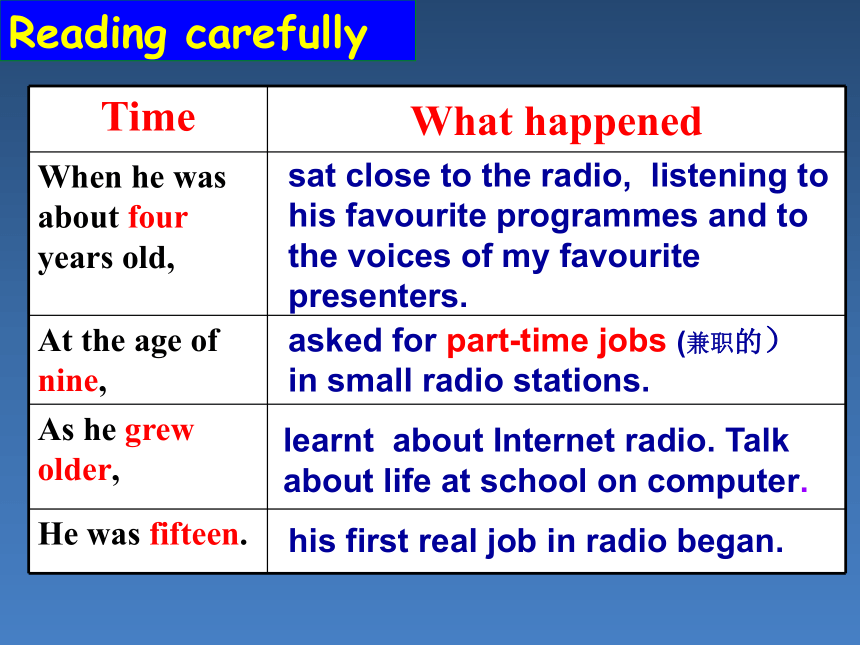

文档简介
(共46张PPT)
When does the radio station start working
Is there a radio station at our school
What do you think of the radio station
at school
Look at the picture and say what you can see.
a microphone
a glass wall
a presenter
in a radio studio / station
an earphone
a presenter / newsreader
in a radio studio / station
a radio studio manager
10
Unit 2
It seemed that they were speaking to me in person.
1.What is the boy
2.Where is he
3.What’s he doing
1. Look at the photo and say what it shows.
He is a radio presenter.
He is in the studio.
He is reading the news.
It probably shows that a newsreader or a presenter is on air.
播出
a) In a book about the history of radio.
b) In the life story of a famous radio presenter.
c) In a book on how radio works.
2. Read the passage and decide where
you are likely to see the photo.
Radio times
“How old are you ” the radio studio manager looked down at me.
“Fifteen,” I said.
Remember: The title will help you to understand the passage.
When you read a story, it is important to understand the order in which different events happen. You may find it useful to draw a timeline and write notes about each event.
3. Complete the sentences.
The writer met _______________ in a
radio station.
2. The manager asked why he wanted a job ________.
3. At the age of four, the writer __________
_________________________, listening to his favourite programmes.
a radio manager
in radio
sat close to
the radio in the living room
4. At the age of nine,he asked for part-time jobs in __________________ .
5. As he grew older,he learnt about ________ _______.
6. This was how the writer’s _______________ _______ began.
small radio stations
Internet
first real job in
radio
radio
Time What happened
When he was about four years old,
At the age of nine,
As he grew older,
He was fifteen.
sat close to the radio, listening to his favourite programmes and to the voices of my favourite presenters.
asked for part-time jobs (兼职的)in small radio stations.
learnt about Internet radio. Talk about life at school on computer.
his first real job in radio began.
Reading carefully
Time What happened
When he was about four years old,
At the age of nine,
As he grew older,
He was fifteen.
sat close to the radio, listening to his favourite programmes and to the voices of my favourite presenters.
asked for part-time jobs in small radio stations.
learnt about Internet radio.
Talk about life at school on computer.
his first real job in radio began.
Retelling
“And you want a job in radio Shouldn’t you be at school ” he asked.
How could I explain I’ve always loved the radio. I still remember, when I was about four years old, I sat close to the radio in the living room, listening to my favourite programmes and to the voices of my favourite presenters. It seemed that they were speaking not to lots of
listeners but to me in person. At the age of nine, I asked for part–time jobs in small radio stations.
As I grew older, my interest in radio grew. One day I learnt about Internet radio. Once a week, I played my favourite music from my father’s computer, talked about life at school, and hoped someone might be listening.
Soon my friends at school started to listen, and then they wanted to help. We prepared
a programme once a week, doing research on articles about music, sports news, jokes and the weather report (I did this by looking out
of the window).
“OK, come with me,” the manager said. I sat down in the studio. He was in another room, behind a glass wall.
“OK, let’s do a sound check. Just tell me what you had for breakfast.”
All radio presenters need to answer the same question before they begin work. The purpose is to check the sound level.
“I had eggs, fruit and some milk.”
“OK, that’s great!” The man behind the glass
said.
This was how my first real job in radio began.
The radio manager looked down at me.
电台经理低头看着我。
look down 向下看
look down at sb. 向下看着某人
相反词组: look up at sb.
Xi Jinping looked down at the little girl
and asked her name.
习近平低头看着小女孩问她的名字
Language points
And you want a job in radio
你想在电台找份工作?
陈述句用升调就变成了问句, 这种问句
称为陈述疑问句。朗读时句尾应该读调。例如:
The train is in already
火车已经进站了?
He hasn’t got my letter
他还没有收到我的信
3. Shouldn’t you be at school
难道你不用上学吗?
这是一个否定疑问句, 表示惊讶。
这种句式还可以表示责难和赞赏。如:
Why are you driving so fast Don’t you know the traffic regulations
你为什么开那么快?难道你不懂交通规则吗?(表示责难)
Aren’t these pictures lovely
这些照片难道不可爱吗?(表示赞赏)
4. I still remember, when I was about four years old, I sat close to the radio in the living room, listening to my favourite programmes and to the voices of my favourite presenters.
我仍然记得在我四岁的时候,我紧挨着客 厅里的收音机坐着,听我最喜欢的节目和 最喜欢的主持人的声音。
1) remember doing sth. “记得做过某事”
remember to do sth. “记着去做某事”
2) close to 临近,靠近
sit close to sth 坐在…的旁边
close在这里是形容词, 意思是“离得近,
距离短”, 它还有“关上”的意思, 如:
The tables were close to the wall.
桌子靠墙放着。
Slowly he closed the book.
他慢慢地合上了书。
3) listening to my favourite programmes, and
to the voices of my favourite presenters
在句中作状语, 表示伴随情况。
4) my favourite programmes 和 the voices of
my favourite presenters 并列作listening to
的宾语, and 后面省略了listening。
5. It seemed that they were speaking not to lots
of listeners but to me in person.
我感觉他们好像不是在和广大听众说话,而是在亲自和我说。
It seems that + 从句 表示“看起来似乎……”;
seem 后面可接形容词, 不定式, 从句。
He seems very happy to get the book.
It seems that no one knew the news.
in person 亲自, 当面
I will go to the meeting in person.
我将亲自赴会。
You can ask him in person. 你可以当面问他。
6. At the age of nine, I asked for part-time jobs in small radio stations.
九岁的时候,我去小电台找过兼职工作。
at the age of 在……岁的时候
She learnt to play the piano at the age of five.
ask for jobs 求职
ask for 1) 要求得到
2) 寻找, 要求见某人
He never asks for help.
There is a girl at the gate, asking for Miss Li.
ask sb. for sth. 向某人要求某物
Mary asked her dad for a new bike.
7. One day, I learn about Internet radio.
有一天我听说了网络电台。
learn about 听说 如:
I’m very keen to learn about the town’s
history.
8. I did this by looking out of the window.
我根据观察窗外的情况得到。
look out of the window 向窗外看
by doing sth. 通过做某事
I learned English by reading magazines.
我通过读杂志学习英语。
9. The purpose is to check the sound level.
目的是检查音质水平。
the purpose is to do sth. 目的是做某事
例如:
The purpose is to get the main idea of the article.
目的是为了了解文章大意。
~ down on
~ back
~ahead
~after
~forward to
look
期待;盼望
照顾;照看
向前看
回忆;回顾
轻视;
瞧不起
1. look forward to 期待;盼望
I’m really looking forward to our
vacation.
我真心盼望假期的到来。
look forward to doing sth.
He was looking forward to working with
the new manager.
他很期待和新经理一起工作。
My mother says she’s looking forward to
meeting you.
我母亲说她正期待着与你见面。
2. look after 照顾;照看
I love looking after the children.
我喜欢照顾孩子们。
My job is to look after these patients.
我的工作就是照顾好这些病人。
They think about survival. They look after their own people.
他们考虑的是生存,关心的是自己的民。
3. look ahead 向前看;考虑将来
This brings me to an important point: when it comes to our career, it is critical to look ahead.
这给了我一个很重要的提示:当谈到我们的事业时,展望未来非常重要。
Nobody gets to live life backward. Look ahead, that is where your future lies.
没有人过着缅怀过去的生活。展望未来,那是你的未来所在。
4. look back 回忆;回顾
When I look back on those days I realized I was desperately unhappy.
当我回想起那些日子,我觉得自己痛苦极了。
What does the song mean to you now, as you look back on it
当你现在回头看时,这首歌目前对你是什么意义?
5. look down on/upon 轻视;瞧不起
Mr Garcia looks down on anyone who hasn’t had a college education.
加西亚先生看不起任何从未受过大学教育的人。
I don’t think people will look down on you because you are serving the customers.
我认为人家不会因为你服务他们而看不起你的。
4. Complete the passage with the correct form of the words and expressions in the box.
article at the age of listener purpose seem studio
Peter (1) ______ to be very happy with his new job. He works in the (2) ______ of a local radio station. He is lucky that (3) ___________ only twenty he is doing something he loves and has a real (4) _________ . Every morning
seems
studio
at the age of
purpose
when he starts work, he does a sound check and then he looks for interesting newspaper (5) ________ to talk about on the show. The (6) _________can phone in to talk to Peter or they can send emails to ask him to play their favourite songs. At the end of the show, he closes down all the equipment and goes home.
articles
listeners
How old are you ” The radio manager looked down at me.
“Fifteen,’’ I said.
“And you want a job in radio Shouldn’t you be at school ”, he asked. describing an important event in the past
“I have always loved the radio. I still remember, when I was four years old, I sat close to the radio in the living room, listening to my favourite programmes and to the voices of my favourite presenters. giving background information
5. Look at the sentences from the passage.
Now find sentences in the passage in Activity 2 which show:
important events in the past
background information
Important events in the past:
— One day I learnt about Internet radio.
— Soon my friends at school started to listen,
and then they wanted to help.
Possible answers
Background information:
— Once a week. I played my favourite music
from my father’s computer, talked about
life at school, and hoped someone might be
listening.
— We prepared a programme once a week,
doing research on articles about music,
sports news, jokes and the weather report
(I did this by looking out of the window).
Think of the thing you love doing, and imagine just because of an event, you had the chance of having a job doing that. Write a passage describing the important event, and give some background information.
Writing
Step 1:Think of the thing you really love doing as your job. It is named A.
A…
Writing
Step 2 Think of the event which makes you had the chance of
having a job doing that.
A…
the event
(I first…;
I met…)
Writing
Step 3 Think of the experiences which can show you like doing it and can do it well.
A…
the event
(I first…;
I met…)
why you love it
(I remeber…;
because I …)
(At the age of…, I…)
(As I grew older, I…)
But in this passage, it starts off in the past, during the writers early career. Then it goes to an earlier past, when he was a child. The order of events in the story is flashback(倒叙) narration interspersed with flashbacks(插叙)
Ending (this was …)
+
Writing
The structure recommended:
It seemed that they were speaking not to…
I hoped someone might be listening.
Just tell me what you had for breakfast.
Pay attention to this:
1.用好过渡词,使文章连贯。
时间:now,then,soon..; 因果:because,since,thanks to…
并列:and,as well as…; 解释说明:that is to say,such as…
2.把握“呼应”原则。
I first appeared on TV at the age of thirteen. A television presenter stopped me in the street, and started to interview me...
6. Write a passage describing an important event in the past and giving background information.
Homework
(P 81)Try to write a review about which programme you have enjoyed recently.
Please introduce its name, content(内容)as well as your feelings and comments(评论).
/si:m/
/'lIsn /
/'pɑ:t'taIm/
看来;似乎 v.
seem
听众;听着 n.
listener
亲自;本人
part-time
兼职的 adj.
in person
Words and expressions
/'ɑ:tIkl/
/'stju:dI /
/'p :p s/
文章;报到 n.
article
录制室;录音室 n.
studio
意图;目的 n.
purpose
Words and expressions
When does the radio station start working
Is there a radio station at our school
What do you think of the radio station
at school
Look at the picture and say what you can see.
a microphone
a glass wall
a presenter
in a radio studio / station
an earphone
a presenter / newsreader
in a radio studio / station
a radio studio manager
10
Unit 2
It seemed that they were speaking to me in person.
1.What is the boy
2.Where is he
3.What’s he doing
1. Look at the photo and say what it shows.
He is a radio presenter.
He is in the studio.
He is reading the news.
It probably shows that a newsreader or a presenter is on air.
播出
a) In a book about the history of radio.
b) In the life story of a famous radio presenter.
c) In a book on how radio works.
2. Read the passage and decide where
you are likely to see the photo.
Radio times
“How old are you ” the radio studio manager looked down at me.
“Fifteen,” I said.
Remember: The title will help you to understand the passage.
When you read a story, it is important to understand the order in which different events happen. You may find it useful to draw a timeline and write notes about each event.
3. Complete the sentences.
The writer met _______________ in a
radio station.
2. The manager asked why he wanted a job ________.
3. At the age of four, the writer __________
_________________________, listening to his favourite programmes.
a radio manager
in radio
sat close to
the radio in the living room
4. At the age of nine,he asked for part-time jobs in __________________ .
5. As he grew older,he learnt about ________ _______.
6. This was how the writer’s _______________ _______ began.
small radio stations
Internet
first real job in
radio
radio
Time What happened
When he was about four years old,
At the age of nine,
As he grew older,
He was fifteen.
sat close to the radio, listening to his favourite programmes and to the voices of my favourite presenters.
asked for part-time jobs (兼职的)in small radio stations.
learnt about Internet radio. Talk about life at school on computer.
his first real job in radio began.
Reading carefully
Time What happened
When he was about four years old,
At the age of nine,
As he grew older,
He was fifteen.
sat close to the radio, listening to his favourite programmes and to the voices of my favourite presenters.
asked for part-time jobs in small radio stations.
learnt about Internet radio.
Talk about life at school on computer.
his first real job in radio began.
Retelling
“And you want a job in radio Shouldn’t you be at school ” he asked.
How could I explain I’ve always loved the radio. I still remember, when I was about four years old, I sat close to the radio in the living room, listening to my favourite programmes and to the voices of my favourite presenters. It seemed that they were speaking not to lots of
listeners but to me in person. At the age of nine, I asked for part–time jobs in small radio stations.
As I grew older, my interest in radio grew. One day I learnt about Internet radio. Once a week, I played my favourite music from my father’s computer, talked about life at school, and hoped someone might be listening.
Soon my friends at school started to listen, and then they wanted to help. We prepared
a programme once a week, doing research on articles about music, sports news, jokes and the weather report (I did this by looking out
of the window).
“OK, come with me,” the manager said. I sat down in the studio. He was in another room, behind a glass wall.
“OK, let’s do a sound check. Just tell me what you had for breakfast.”
All radio presenters need to answer the same question before they begin work. The purpose is to check the sound level.
“I had eggs, fruit and some milk.”
“OK, that’s great!” The man behind the glass
said.
This was how my first real job in radio began.
The radio manager looked down at me.
电台经理低头看着我。
look down 向下看
look down at sb. 向下看着某人
相反词组: look up at sb.
Xi Jinping looked down at the little girl
and asked her name.
习近平低头看着小女孩问她的名字
Language points
And you want a job in radio
你想在电台找份工作?
陈述句用升调就变成了问句, 这种问句
称为陈述疑问句。朗读时句尾应该读调。例如:
The train is in already
火车已经进站了?
He hasn’t got my letter
他还没有收到我的信
3. Shouldn’t you be at school
难道你不用上学吗?
这是一个否定疑问句, 表示惊讶。
这种句式还可以表示责难和赞赏。如:
Why are you driving so fast Don’t you know the traffic regulations
你为什么开那么快?难道你不懂交通规则吗?(表示责难)
Aren’t these pictures lovely
这些照片难道不可爱吗?(表示赞赏)
4. I still remember, when I was about four years old, I sat close to the radio in the living room, listening to my favourite programmes and to the voices of my favourite presenters.
我仍然记得在我四岁的时候,我紧挨着客 厅里的收音机坐着,听我最喜欢的节目和 最喜欢的主持人的声音。
1) remember doing sth. “记得做过某事”
remember to do sth. “记着去做某事”
2) close to 临近,靠近
sit close to sth 坐在…的旁边
close在这里是形容词, 意思是“离得近,
距离短”, 它还有“关上”的意思, 如:
The tables were close to the wall.
桌子靠墙放着。
Slowly he closed the book.
他慢慢地合上了书。
3) listening to my favourite programmes, and
to the voices of my favourite presenters
在句中作状语, 表示伴随情况。
4) my favourite programmes 和 the voices of
my favourite presenters 并列作listening to
的宾语, and 后面省略了listening。
5. It seemed that they were speaking not to lots
of listeners but to me in person.
我感觉他们好像不是在和广大听众说话,而是在亲自和我说。
It seems that + 从句 表示“看起来似乎……”;
seem 后面可接形容词, 不定式, 从句。
He seems very happy to get the book.
It seems that no one knew the news.
in person 亲自, 当面
I will go to the meeting in person.
我将亲自赴会。
You can ask him in person. 你可以当面问他。
6. At the age of nine, I asked for part-time jobs in small radio stations.
九岁的时候,我去小电台找过兼职工作。
at the age of 在……岁的时候
She learnt to play the piano at the age of five.
ask for jobs 求职
ask for 1) 要求得到
2) 寻找, 要求见某人
He never asks for help.
There is a girl at the gate, asking for Miss Li.
ask sb. for sth. 向某人要求某物
Mary asked her dad for a new bike.
7. One day, I learn about Internet radio.
有一天我听说了网络电台。
learn about 听说 如:
I’m very keen to learn about the town’s
history.
8. I did this by looking out of the window.
我根据观察窗外的情况得到。
look out of the window 向窗外看
by doing sth. 通过做某事
I learned English by reading magazines.
我通过读杂志学习英语。
9. The purpose is to check the sound level.
目的是检查音质水平。
the purpose is to do sth. 目的是做某事
例如:
The purpose is to get the main idea of the article.
目的是为了了解文章大意。
~ down on
~ back
~ahead
~after
~forward to
look
期待;盼望
照顾;照看
向前看
回忆;回顾
轻视;
瞧不起
1. look forward to 期待;盼望
I’m really looking forward to our
vacation.
我真心盼望假期的到来。
look forward to doing sth.
He was looking forward to working with
the new manager.
他很期待和新经理一起工作。
My mother says she’s looking forward to
meeting you.
我母亲说她正期待着与你见面。
2. look after 照顾;照看
I love looking after the children.
我喜欢照顾孩子们。
My job is to look after these patients.
我的工作就是照顾好这些病人。
They think about survival. They look after their own people.
他们考虑的是生存,关心的是自己的民。
3. look ahead 向前看;考虑将来
This brings me to an important point: when it comes to our career, it is critical to look ahead.
这给了我一个很重要的提示:当谈到我们的事业时,展望未来非常重要。
Nobody gets to live life backward. Look ahead, that is where your future lies.
没有人过着缅怀过去的生活。展望未来,那是你的未来所在。
4. look back 回忆;回顾
When I look back on those days I realized I was desperately unhappy.
当我回想起那些日子,我觉得自己痛苦极了。
What does the song mean to you now, as you look back on it
当你现在回头看时,这首歌目前对你是什么意义?
5. look down on/upon 轻视;瞧不起
Mr Garcia looks down on anyone who hasn’t had a college education.
加西亚先生看不起任何从未受过大学教育的人。
I don’t think people will look down on you because you are serving the customers.
我认为人家不会因为你服务他们而看不起你的。
4. Complete the passage with the correct form of the words and expressions in the box.
article at the age of listener purpose seem studio
Peter (1) ______ to be very happy with his new job. He works in the (2) ______ of a local radio station. He is lucky that (3) ___________ only twenty he is doing something he loves and has a real (4) _________ . Every morning
seems
studio
at the age of
purpose
when he starts work, he does a sound check and then he looks for interesting newspaper (5) ________ to talk about on the show. The (6) _________can phone in to talk to Peter or they can send emails to ask him to play their favourite songs. At the end of the show, he closes down all the equipment and goes home.
articles
listeners
How old are you ” The radio manager looked down at me.
“Fifteen,’’ I said.
“And you want a job in radio Shouldn’t you be at school ”, he asked. describing an important event in the past
“I have always loved the radio. I still remember, when I was four years old, I sat close to the radio in the living room, listening to my favourite programmes and to the voices of my favourite presenters. giving background information
5. Look at the sentences from the passage.
Now find sentences in the passage in Activity 2 which show:
important events in the past
background information
Important events in the past:
— One day I learnt about Internet radio.
— Soon my friends at school started to listen,
and then they wanted to help.
Possible answers
Background information:
— Once a week. I played my favourite music
from my father’s computer, talked about
life at school, and hoped someone might be
listening.
— We prepared a programme once a week,
doing research on articles about music,
sports news, jokes and the weather report
(I did this by looking out of the window).
Think of the thing you love doing, and imagine just because of an event, you had the chance of having a job doing that. Write a passage describing the important event, and give some background information.
Writing
Step 1:Think of the thing you really love doing as your job. It is named A.
A…
Writing
Step 2 Think of the event which makes you had the chance of
having a job doing that.
A…
the event
(I first…;
I met…)
Writing
Step 3 Think of the experiences which can show you like doing it and can do it well.
A…
the event
(I first…;
I met…)
why you love it
(I remeber…;
because I …)
(At the age of…, I…)
(As I grew older, I…)
But in this passage, it starts off in the past, during the writers early career. Then it goes to an earlier past, when he was a child. The order of events in the story is flashback(倒叙) narration interspersed with flashbacks(插叙)
Ending (this was …)
+
Writing
The structure recommended:
It seemed that they were speaking not to…
I hoped someone might be listening.
Just tell me what you had for breakfast.
Pay attention to this:
1.用好过渡词,使文章连贯。
时间:now,then,soon..; 因果:because,since,thanks to…
并列:and,as well as…; 解释说明:that is to say,such as…
2.把握“呼应”原则。
I first appeared on TV at the age of thirteen. A television presenter stopped me in the street, and started to interview me...
6. Write a passage describing an important event in the past and giving background information.
Homework
(P 81)Try to write a review about which programme you have enjoyed recently.
Please introduce its name, content(内容)as well as your feelings and comments(评论).
/si:m/
/'lIsn /
/'pɑ:t'taIm/
看来;似乎 v.
seem
听众;听着 n.
listener
亲自;本人
part-time
兼职的 adj.
in person
Words and expressions
/'ɑ:tIkl/
/'stju:dI /
/'p :p s/
文章;报到 n.
article
录制室;录音室 n.
studio
意图;目的 n.
purpose
Words and expressions
同课章节目录
- Module 1 Feelings and impressions
- Unit 1 It smells delicious.
- Unit 2 I feel nervous when I speak Chinese .
- Unit 3 Language in use
- Module 2 Experiences
- Unit 1 I've also entered lots of speaking competi
- Unit 2 They have seen the Pyramids.
- Unit 3 Language in use
- Module 3 Journey to space
- Unit 1 Has it arrived yet?
- Unit 2 We have not found life on any other planet
- Unit 3 Language in use
- Module 4 Seeing the docto
- Unit 1 I haven't done much exercise since I got m
- Unit 2 We have played football for a year now
- Unit 3 Language in use
- Module 5 Cartoons
- Unit 1 It's time to watch a cartoon.
- Unit 2 Tintin has been popular for over eighty yea
- Unit 3 Language in use
- Revision module A
- Module 6 Hobbies
- Unit 1 Do you collect anything ?
- Unit 2 Hobbies can make you grow as a person.
- Unit 3 Language in use
- Module 7 Summer in Los Angeles
- Unit 1 Please write to me and send me some photos
- Unit 2 Fill out a form and come to learn English
- Unit 3 Language in use
- Module 8 Time off
- Unit 1 I can hardly believe we are in the city ce
- Unit 2 We thought somebody was moving about
- Unit 3 Language in use
- Module 9 Friendship
- Unit 1 Could I ask if you've mentioned this to he
- Unit 2 I believe that the world is what you think
- Unit 3 Language in use
- Module 10 On the radio
- Unit 1 I hope that you can join us one day
- Unit 2 It seemed that they were speaking to me in
- Unit 3 Language in use
- Revision module B
